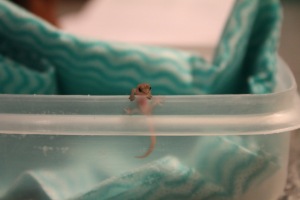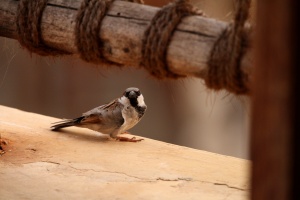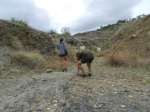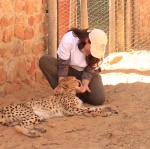For everyone wondering whatever happened to dear little Santiago, fear not. He has not been forgotten. And now he has been immortalized in a book about his many true adventures. Santiago: True Tales of a Little Bug in a Big World, which was released on June 5th, 2019, just in time for World Environment Day! Yes, it’s a long title. But it tells you exactly what the book is about. I like to manage expectations like that. Check out http://www.lateshiftmedia.com/children-s-books for more info. Or head over to his Facebook page (because of COURSE he has social media…): http://www.facebook.com/alittlebuginabigworld
The book is a middle-grade kids’ book told from Santiago’s viewpoint of what it’s like to be a wild animal raised by a human parent. While the story is whimsical and light in many ways, it also tackles much larger and deeper subjects, like finding your voice and place in the world, facing the challenges of growing up, and practicing understanding and tolerance of things different from you. But the book isn’t just for kids. It appeals to adults as well, especially those still struggling to find their path and parents struggling with raising kids and making choices that you hope are right and best for your child. It’s really just fun for the whole family. And I hope it will make more people think more positively of insects.  Here’s a little update on what else has been going on, since I know I have been silent for quite some time now. In addition to finishing the book and promoting it through podcasts, school and library visits, and teaching workshops based on it, my life lately has also been dedicated to writing and recording new music, teaching photography and creativity workshops, starting up a podcast (Nature Knows), learning how to edit videos, and running online events. It’s amazing how many iterations a life can take.
Here’s a little update on what else has been going on, since I know I have been silent for quite some time now. In addition to finishing the book and promoting it through podcasts, school and library visits, and teaching workshops based on it, my life lately has also been dedicated to writing and recording new music, teaching photography and creativity workshops, starting up a podcast (Nature Knows), learning how to edit videos, and running online events. It’s amazing how many iterations a life can take.
What I learned working on the book that I’d like to share with everyone thinking of writing a book is the following:
It is amazing the number of times you can read, re-read, re-read, and re-read again and STILL manage to miss typos.
Revision is your best friend. As is a good editor and good copyeditor. And a good illustrator. If you don’t have design experience, best to hire someone who does. I was lucky – I know design already, and, being a photographer who used photos of Santiago in the book, it was easy for me to put the cover art together. But if that’s not your area of expertise (and honestly, even if it is, it’s never a bad idea to get some outside ideas – you never know what genius design someone else will bring to the table), definitely hire someone to do it for you.
Research your market before setting pen to paper to get to know your specific genre.
Schedule writing time. If you don’t schedule it, you won’t do it, I promise you. We all have a habit of finding ways to fill the space. I see you, social media… Set time in your calendar and stick to it, even if you spend the time doodling. It’s about getting your head in the game and it’s a funny trick to make you believe you are a writer and not just someone who would like to be one.
Since the book features actual photos of my mantis child, I had to curate all the pictures I had of him and size them appropriately. Which takes a lot longer that one might think. Mostly because I thought I was all organised and had put all the pictures in folders. But I was clearly deluding myself about my organisational forethought. Because not only was there minimal method to the madness of the folders I had created, but some of the photos came from two different cell phones, one of which I wasn’t using anymore. It was a process.
Related but not, in addition to Santiago’s photos, I’ve also finally started to curate and catalog my wildlife photos and created a coffee table book called Faces of Extinction, a portion of the proceeds of which supports an NGO called Wild Tomorrow Fund. Wild Tomorrow Fund is based in NYC but supports conservation efforts in South Africa, including an organisation I worked for when I first moved to South Africa. Wild Tomorrow Fund purchases equipment and land for conservation purposes, such as uniforms for rangers and acreage to increase wildlife habitat. That book is also available on the website listed above.
It’s been a busy year, despite the pandemic. Whew!



























